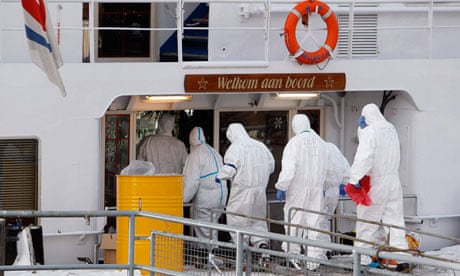The number of people affected by an outbreak of the winter vomiting bug could have passed 1 million, the Health Protection Agency has reported.
The virus – which has closed hospitals, forced some North Sea oil workers to evacuate a rig, shut schools and struck down passengers on cruise liners – was believed to have caused illness in more than 120,000 people in the past week.
The HPA said the number of laboratory-confirmed cases of norovirus had reached 3,538 in England and Wales, up from 3,046 last week and an 83% increase on the 1,934 cases at this time last year.
But the agency said for every reported case an estimated 288 was going unreported, meaning there could be 1.01 million cases, up from just under 880,000 last week.
Norovirus is highly contagious and can be transmitted through contact with an infected person or contaminated surfaces and objects. It is known to spread rapidly in closed environments such as hospitals, schools and nursing homes, with symptoms including sudden vomiting, diarrhoea, or both, a temperature, headache and stomach cramps.
Professor Ian Clarke, from Southampton University, who has studied norovirus for 20 years and whose team was the first to genetically decode the bug said one reason it was highly contagious was because only a few particles were needed to start an infection.
The virus derives its name from Norwalk-Bronson elementary school in Ohio, US, after an outbreak in 1968 infected 150 children. Using samples taken at the time, scientists were able to discover that only 10 virus particles needed to be ingested to cause infection.
Clarke added that the vomiting bug was extremely resilient and could live for long periods outside of a host. "It's a very stable virus and so it is extremely hardy in the environment … The virus is very hard to eliminate … especially from soft furnishings."
He said two groups of US researchers were working on vaccines, which would be reported next year.
The total number of cases has risen earlier than expected this year, after an as-yet-unexplained upward trend seen across Europe, Japan and Australia.
Passengers on a 10-day P&O European holiday described scenes of chaos and dubbed their cruise liner "a plague ship" after 400 travellers were struck down by the winter bug earlier this month.
It has also been reported that the Queen Mary 2 had also been hit by an outbreak over Christmas, with guests unable to shake hands and those attending church services receiving communion by a vicar in gloves to avoid contact.
In the days leading up to the Christmas holidays schools across the UK closed early and had to skip nativity plays in response to the virus infecting hundreds of staff and children.
In the two weeks to 23 December there had been 70 reported hospital outbreaks of the virus, compared with 61 in the previous fortnight, bringing the season total to 538, the HPA said.
On Friday NHS Tayside was forced to close a ward at Dundee's Ninewells hospital for infection control measures shortly after reopening another. Meanwhile, Surrey and Sussex Healthcare NHS Trust apologised after closing East Surrey hospital to visitors for a third time in the past two months.
John Harris, an HPA norovirus expert, said: "The number of laboratory confirmed cases has risen once again as it appears that we have seen the rise in cases that usually begins in January start a little earlier than we normally expect.
"Norovirus is very contagious and very unpleasant. To help prevent spread of the disease, it's important that people who believe they are unwell with the virus maintain good hand hygiene and stay away from hospitals, schools and care homes, as these closed environments are particularly prone to outbreaks, which can cause severe disruption."




